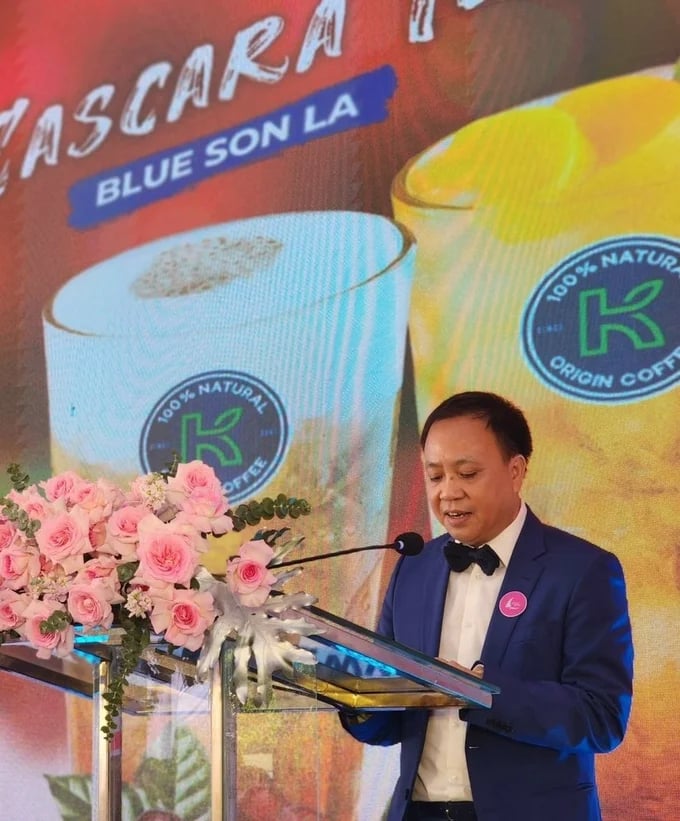November 27, 2025 | 22:44 GMT +7
November 27, 2025 | 22:44 GMT +7
Hotline: 0913.378.918
November 27, 2025 | 22:44 GMT +7
Hotline: 0913.378.918

Inauguration of the cascara tea factory in Son La
Cascara tea, also known as coffee tea, has become popular in cafes in European and American countries. The word “cascara” in Spanish means husk or skin. This drink is an herbal beverage made from the dried skins of coffee cherries.
Cascara tea has been used in South American countries for about 50 years and the United States has been selling it domestically for a long time. However, in Vietnam, cascara tea is still very new and Phuc Sinh is the first company to exploit cascara tea products on a large scale at Phuc Sinh Son La factory located in Mai Son district, Son La province.
Over the world in recent years, many countries have favoured Cascara Tea, in Europe they buy it at nearly double the price of Wash Arabica coffee. Cascara tea is a type of tea that can bring many benefits. It can help us maintain a reasonable weight, have good digestion, and have many antioxidants that help keep the user's skin smooth.
Vietnamese-branded cascara tea is produced with a production line that includes a food-standard fruit cleaning system, peeling, UV drying, multi-function freeze drying system that ensures cleanliness and retains flavour, and colours, and the automatic packaging system that can produce square filter bags and triangle filter bags. The design line capacity is 0.5 tons per production batch and employs 3 workers.

Chairman of Phuc Sinh Group Phan Minh Thong affirmed the value of the cascara tea brand.
Speaking at the inauguration ceremony of Vietnam's first factory producing cascara tea according to international standards to supply the domestic and export markets, the Chairman of Phuc Sinh Group Phan Minh Thong, shared: “We can see that almost 100% of coffee cherries are destroyed by composting or burning; we face a lot of pollution problems caused by coffee peels. However, with this cascara tea production line combined with the Wash Arabica processing process, we have a special type of tea that brings very high nutritional and economic value. We are very proud to contribute to such a circular ecosystem and green environment.
We have been processing cascara tea for the past few years, but today we officially built a factory and produced a much larger output. We export up to 99% of our output to countries that use cascara tea in the world such as Italy, France, and other European countries".
Translated by Hoang Duy

(VAN) China’s cooking oil is suddenly flooding into India. It all comes down to a soybean surplus that Beijing doesn’t quite know what to do with.

(VAN) An Giang promotes supply-demand connections, standardizes quality and builds value chains, creating a foundation for sustainable bird’s nest development and aiming to expand exports.
/2025/11/24/5339-4-nongnghiep-075331.jpg)
(VAN) Recently, the conference on 'Sustainable Fisheries Linkage Chain - Tilapia for Export' took place in Tien Hai commune, Hung Yen province.
/2025/11/21/4309-2-153400_128.jpg)
(VAN) Green and low-emission rice is paving the way for Vietnamese rice to enter high-end markets, marking the beginning of a transformation journey toward greening and elevating the national rice brand.

(VAN) ‘Right to Win’ outlines a national action plan that shapes a new vision for Viet Nam’s agriculture in an era of renewal and global integration.

(VAN) Lam Dong’s farmed sturgeon output this year is expected to reach 2,300 tons, worth VND 450 billion, affirming the brand’s position on the market.

(VAN) A surge in Ukrainian egg exports, largely driven by soaring sales to the UK over the last few years, has notably pushed up egg prices on the domestic market.